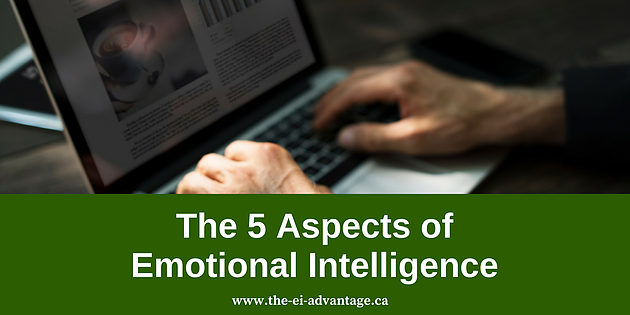Blog
The 5 Aspects of Emotional Intelligence
July 31, 2017

As modern businesses progress towards team-based approaches to workplace development and coaching, leaders have had to hone-in on their own emotional intelligence in order to successfully coach employees and strengthen their individual leadership skills. Leaders who have a strong understanding of their own emotional intelligence (EI), become increasingly equipped with the four key skills of a leader: innovation, insight, authenticity, and the ability to coach others.
EI coaching in the workplace opens the doors to enhancing both professional and personal environments, while gaining an understanding as to how leaders can coach others to build meaningful relationships and future leaders.
There are 5 core aspects that demonstrate a healthy understanding of one’s own EI, and how to understand the emotions of others:
1. Self-Awareness
As a self-aware individual, you have a solid base on which to develop and strengthen other aspects of your EI. Self-awareness encompasses the understanding of your own emotions, including emotional triggers, and the reactive tendencies which accompany them. For leaders, learning to be self-aware is crucial, as you can better manage your emotions and handle tough situations effectively.
By harnessing your ability to be aware of your emotions, you can engage with and filter through disruptive emotions, or emotions that are simply reactive. In the workplace, a calm and level-headed leader creates a sense of trust and control, leading to better communication and a more positive work environment.
2. Empathy
Empathy is the ability of an individual to put themselves in another’s place to gain an understanding of their emotions within certain situations. For leaders, this trait allows for an increased understanding of how an employee may be feeling and to create efficient solutions with a sense of compassion. This desire to help in times of stress helps create a better relationship with that individual, while motivating others to react in the same way during run-ins with similar issues.
3. Effective Communication Skills
Leaders with high EI realize that they not only need to listen to their peers and employees, but attempt to gain a deeper understanding of what they are saying. Behind every stressful situation at work are countless emotions that are usually left unsaid.
Leaders who can recognize and acknowledge these emotions in another make people feel like they are truly being listened to and heard. This allows for leaders to connect with their staff and develop truly meaningful relationships, while streamlining communication within the workplace.
4. Healthy Relationship Management
Within a workplace, and outside of it, people cannot create meaningful relationships if they’re not in touch with their own emotions. With so many distractions in our daily lives, ensuring that you have a healthy understanding of yourself and your own emotions might be thought of as another to-do item to add to the list. But when you focus on your own emotional intelligence, you’ll be able to create and maintain healthy and productive relationships through bettered communication and a deeper understanding of others.
5. Awareness of Your Emotional Surroundings
This aspect of EI goes further than the one-on-one conversations that involve active listening and empathy. Being aware of the emotional environment that you’re surrounded by involves being emotionally connected and tuned-in to the feelings and emotional factors that can determine how an entire workplace operates.
Within a workplace, there are countless worries and fears that are commonly found, whether it is rumored financial struggles or job cutbacks. Leaders who are able to pick-up on these emotions and effectively communicate solutions, or simply listen to an employee, create an increased sense of trust and loyalty from their employees.
By being aware of these 5 crucial aspects of emotional intelligence, highly-effective leaders are able to strengthen their own skills, while creating a safe, healthy workplace for their peers. EI coaching serves to help these leaders understand their own EI, and teaches them the skills necessary to coach others to understanding theirs, as well.
At Coaching iNSIGHTS, we offer a variety of coaching training sessions. Get in touch and ask us about our upcoming EI training sessions, or how you can book your next EI training session for your workplace.
